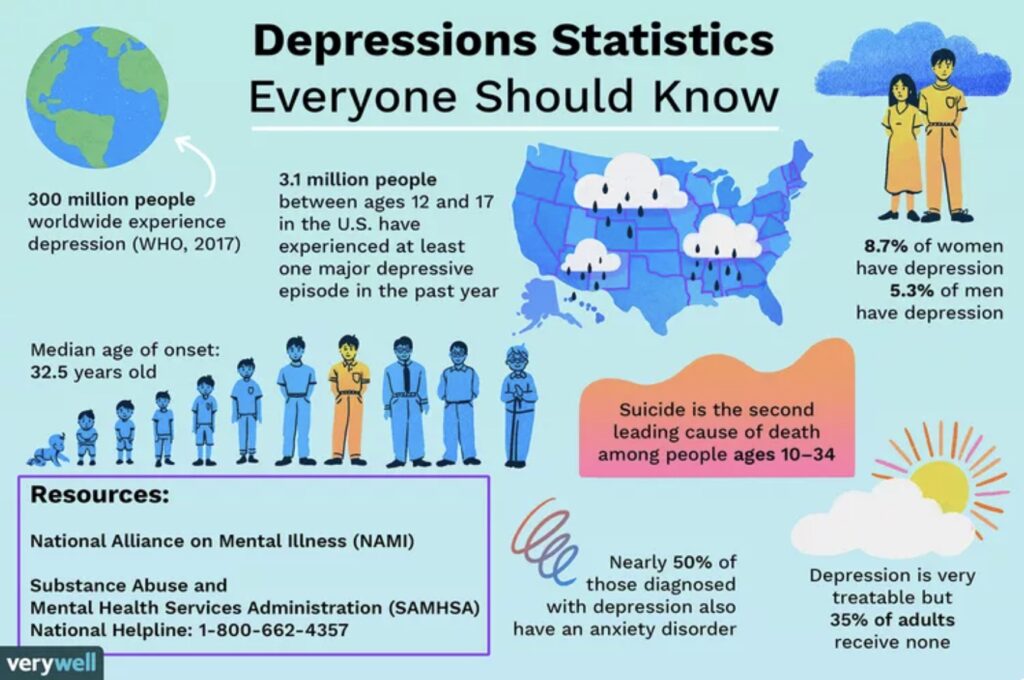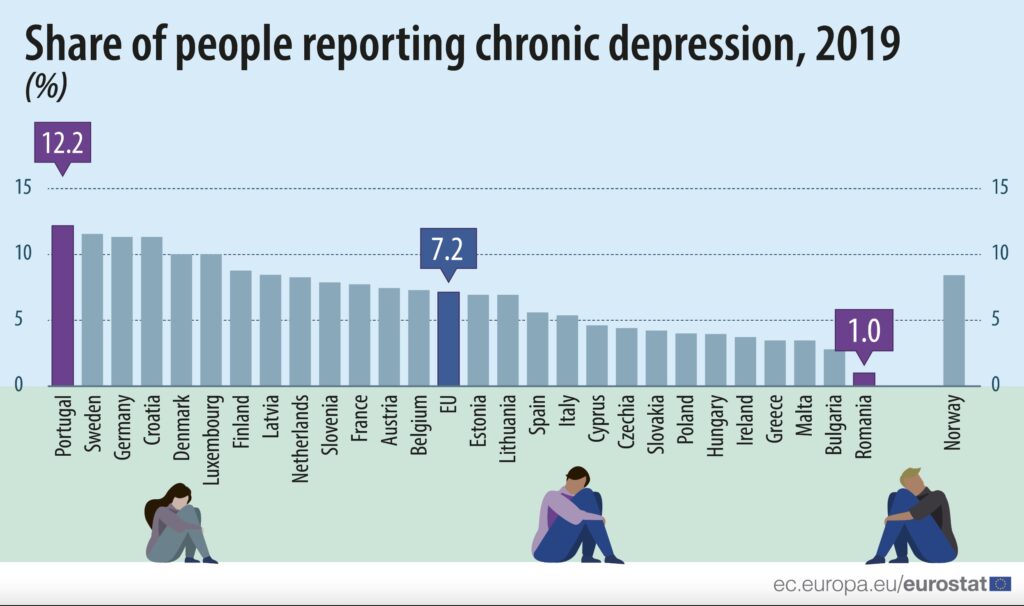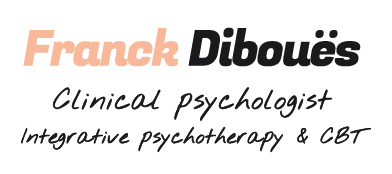Depression therapist in Singapore
- Your ability to think or concentrate decrease
- Your interest of pleasure diminish
- You have negative thoughts
- You loose or gain weight
- You often think of death
- You lack of energy
- You feel slow
Are these signs here for more than two weeks ?
If you reply yes to most of these questions and your condition is for at least two consecutive weeks, you probably are depressed.
I can help you to overcome your depression in Singapore
I’m Franck Dibouës, Clinical psychologist since 2003 after being graduated of a Master in France.
I worked with patients with depression for years and trained in Paris in Cognitive and Behavioral Therapy (CBT) for continuing education.
CBT is the, scientifically proven, most effective psychotherapy to treat depression and anxiety.
With my 20 years experience, I will help you to overcome your depression.

Steps of the depression therapy
Firstly, I will assess your condition and will make a diagnostic during a clinical intereview.
The assessment tool can be « Beck Depression Inventory » or any similar questionnaire.
If you have a depression, the psychotherapy will follow several other steps.
Psychoeducation of the depression, to understand the relation in between thoughts, emotions and behaviors.
How the negative thoughts, emotions and some behaviors maintain the depression.
Psychoeducation is also about lifestyle and stress management (food, sleep, hobbies…).
To identify and to criticize your negative thoughts to struggle against them.
These first steps are just the beginning of the psychotherapy which requires the participation of the person who is depressed to be effective.
At the end of the consultation
- You will feel relief to talk about this difficult situation.
- You should start to overcome negative thoughts which parasite you.
- You will gradually gain more energy.
- You will gradually overcome your depression.
- Once the depression will be overcome, you will be actively self-conscious to struggle against the relapse.
Where to consult us for depression in Singapore ?
The clinic is located in Central Business District, 150 Cecil Street.
For convenience, the session can also be made remotely.
Some studies showed that psychotherapy is as efficient online as in face to face.


Consultation fee
- 45 min to 1h consultation
- Personnalized solutions
250 SGD
You will receive an invoice to claim your health insurance.
To make an appointment
You can contact me by WhatsApp, we will set an appointment:
Or you can contact me via the form below:
Q & A
What is depression ?
It’s a mental condition which affects 5.8% of the population in Singapore and more or less 7 % of the population in the EU and in the USA.
It can begin at any age and can affect people of all races and socioeconomic statuses.
Depression is a pathological state that does not depend on an individual’s moral strength.
Other factors, biological and environmental play an important role in depression on its onset and its maintenance.


How to recognize depression ?
The medical term for depression is Major Depressive Disorder or MDD.
As defined in the DSM 5 (1), an individual with an MDD will show at least five of these following symptoms during two consecutive weeks:
- Depressed mood most of the day, nearly every day.
- Markedly diminished interest or pleasure in all, or almost all, activities most of the day, nearly every day.
- Significant weight loss when not dieting or weight gain, or decrease or increase in appetite nearly every day.
- A slowing down of thought and a reduction of physical movement (observable by others, not merely subjective feelings of restlessness or being slowed down).
- Fatigue or loss of energy nearly every day.
- Feelings of worthlessness or excessive or inappropriate guilt nearly every day.
- Diminished ability to think or concentrate, or indecisiveness, nearly every day.
- Recurrent thoughts of death, recurrent suicidal ideation without a specific plan, or a suicide attempt or a specific plan for committing suicide.
Mnemonic
The mnemonic MSIGECAPS can be used to remember the criteria for major depressive disorder(2):
M – Mood
S – Sleep
I – Interest
G – Guilt/Worthlessness
E – Energy
C – Concentration
A – Appetite
P – Psychomotor Slowing
S – Suicide
Why am I depressed ?
Like the other psychological issues, depression is caused by several factors, never only by one.
Most psychological disorders are caused by:
Biological factors (gender, first-degree family members with MDD increases to 2 to 4 times risk for depression, usage of substance like prohibited drugs or alcohol, lack of sleep, health & lifestyle, medical conditions such as diabetes, obesity, cardiovascular disease…)
Psychological factors (personality, stress perceived, way to cope with stress, history of life, traumas, adverse childhood events, self-esteem, self-confidence, assertiveness…)
Sociological factors (surrounding which induce or increase stress VS. benevolent one, socioeconomic status, lack of interpersonal relationships, divorce, separation…)
For some reason, some individuals cope better with stress than others.
What to do against depression ?
Science shows evidence that treating depression is better than no treatment (psychotherapy with or without drugs)(3).
Science recommends both psychotherapy and drugs.
Psychotherapy, especially Cognitive and Behavioral Therapy is recommended first, as long as the intensity of the MDD is not too strong.
But if so, the drug can be prescribed first to boost energy and to allow people to have enough energy and psychological availability to do psychotherapy.
The CBT of depression has a specific structure. The first goal will be to identify the negative thoughts to struggle with them.
Indeed, the negative thoughts induce negative emotions like sadness or anger which create a depressed mood.
This depressed mood drive to negative behaviors (social withdrawal, reduction or disappearance of hobbies and pleasant activities…) which will need to be addressed in the CBT.
The negative thoughts, the negative emotions and the negative
behaviors (maintenance factors) create and maintain the depression through a vicious circle, thus which will be addressed in the CBT.
1 The DSM 5 is the manual of reference for psychopathology and psychiatry. It helps clinicians to make diagnostics.
2 Mnemonics in a mnutshell: 32 aids to psychiatric diagnosis, Current Psychiatry. 2008, October;7(10):27-33, Jason P. Caplan, MD, Theodore A. Stern, MD
3 Cuijpers P, Quero S, Dowrick C, Arroll B. Psychological Treatment of Depression in Primary Care: Recent Developments. Curr Psychiatry Rep. 2019 Nov 23;21(12):129.doi: 10.1007/s11920-019-1117-x. PMID: 31760505; PMCID: PMC6875158.
